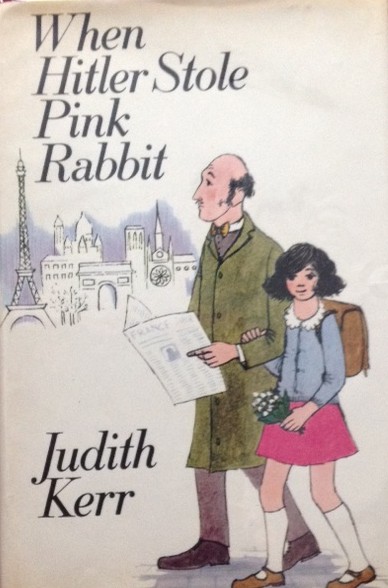Inspiring Young Readers
 posted on 12 Apr 2018
posted on 12 Apr 2018
When Hitler Stole Pink Rabbit by Judith Kerr
The redoubtable Judith Kerr, creator of The Tiger Who Came To Tea and Mog, The Forgetful Cat, is still making appearances at literary festivals across the country despite now being in her 95th year. If you take the chance to go and see her you’ll find that she’s still a tiny packet of enthusiasm, if a little too frail to take on book signings these days. What you might not guess is that Kerr is herself a refugee, a secular Jew who along with the rest of her family had to flee the rise of the Nazis in Germany at the start of the 1930s and suffered the fear and privation of moving from her home, first to Switzerland, then France and ultimately to Britain.
She has subsequently written and spoken quite extensively about what it felt like to be a nine or ten year old caught-up in such huge historical events and her 1971 novel for older children ( and plenty of adults too), When Hitler Stole Pink Rabbit, is a fictionalised autobiography of those times. Kerr writes the book through the eyes of nine year-old Anna but it is immediately clear that Anna is a transparent construct of the author herself. Just as Kerr had a father who was a fearless journalist who was forced to flee Germany just before he was arrested, so too for Anna.
The family flees on a tense train journey to Switzerland and, after a short stay there, on to Paris where Anna’s father has a chance of earning some kind of living as a journalist and political commentator once again. The family goes from relative financial security to quite difficult economic circumstances, living in a small Parisian flat and having to make do with what they have – even replacement clothes for the growing Anna are a problem they have to solve.
They learn not only that all their property in Germany has been seized by Hitler’s regime but that there is also a reward being offered to anyone who returns Anna’s father to the German authorities. Anna has been forced to leave behind most of her belongings, including her beloved pink rabbit toy, which she imagines is now being cuddled by Hitler himself.
Kerr keeps us looking through the eyes of - and with the priorities of - nine year old Anna and this prevents the overall tone of the book from becoming too weighty or too depressing. The natural resilience of the children constantly comes through not just in their capacity to adapt to changing social and physical circumstances but in their ability to understand the situation their parents find themselves in. The humour that underpins many of the book’s episodes often springs from the complete impracticality and domestic uselessness of the adults – look out for some terrible kitchen disasters and a laugh-out-loud episode with a vintage (broken) sewing machine.
Having said that, the tragedy of their situation is not ignored. We aren’t allowed to see Anna and her family’s plight as a game or as something slight and the seriousness of their circumstances is underlined when, towards the end, we hear of the death of her uncle who couldn’t bring himself to believe that the German public wouldn’t come to their senses and throw Hitler out.
The themes of war, displacement, hardship and intolerance are, of course, at the heart of this book and it would be nice to be able to say they represent a dark moment in our history and that we’ve learned the lessons. But clearly we haven’t and once again war and refugees disfigure the global landscape. We can only hope that books like this and what they represent, alongside the admirable values of people like Judith Kerr, can help us win through again at a moment when things look so bleak.
Terry Potter
April 2018